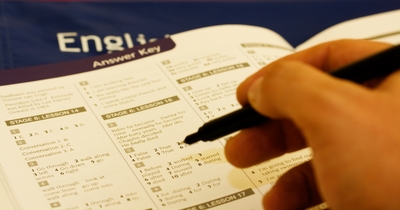Here’s a quick quiz. Tell me which of the following are English and which aren’t. For each one, say why it is or isn’t English and, if it’s not, what language it is.
- There’s no place to plug your car in in the parkade.
- A wha dat dey dem people deh nyam ih smell sweet.
- He was found to have contraband in the boot and under the bonnet, so he is in gaol.
- Breid is a staple fuid prepared by bakin a daich o floor an watter.
- That pom’s running around like a chook with its head cut off.
- Biiolojii esa saiens, daa studehs lief, plant a’ anamal.
- Sildenafil is contraindicated in hypertension.
- I might have the odd poutine, but mostly I don’t pig out.
- Tell me, what is one to do yaar? They are like that only.
- Ðā ġeseah ðæt wīf ðæt ðæt trēow wæs gōd tō etenne.
- If yall are fixin to go, I might could leave early.
- One coffee regular. All set?
- I damn tired den langgar the car lor. Dun know oreddy lah!
 Wasn’t that fun? As you may have guessed, all of the above are versions of English from different places (and, in one case, a different time). But of course they’re not equally acceptable in all contexts, and some are sometimes treated as different languages now. I’m willing to bet that several of them were more than a little hard to understand, and most of them seemed somehow “wrong” to you. So, let’s look at what they are and what they mean.
Wasn’t that fun? As you may have guessed, all of the above are versions of English from different places (and, in one case, a different time). But of course they’re not equally acceptable in all contexts, and some are sometimes treated as different languages now. I’m willing to bet that several of them were more than a little hard to understand, and most of them seemed somehow “wrong” to you. So, let’s look at what they are and what they mean.
- Albertan: There’s no place to plug in the block heater on your car engine in the parking garage.
- Jamaican (patois; from Chat Jamaican by J.J. Thomas): What are those people eating? It smells sweet.
- British: He was found to have contraband in the trunk and under the hood, so he is in jail.
- Scots (from http://sco.wikipedia.org/wiki/Breid): Bread is a staple food prepared by baking a dough of flour and water.
- Australian: That British person is running around like a chicken with its head cut off.
- Pitkern and Norfuk (Pitcairn and Norfolk; descendants of the crew of the Bounty; from http://pih.wikipedia.org/wiki/Biiolojii): Biology is a science that studies life, both plant and animal.
- Medical jargon: Viagra® should not be prescribed to people with high blood pressure.
- Canadian: I might have the occasional dish of french fries with cheese and gravy, but mostly I don’t eat to excess.
- Indian English: Tell me, what can one do, man? They are just like that.
- Old English (Anglo-Saxon; from http://www.oldenglishaerobics.net/fall.html): Then the woman saw that the tree was good to eat.
- Southern U.S. English: If you [plural] are getting ready to go, I just might be able to leave early.
- New England English: One coffee with cream and sugar. Is that everything?
- Singlish (Singapore English; from http://en.wikipedia.org/wiki/Singlish): I was really tired, which is why I crashed into the other car. I don’t know any more about it!
There is not one “right” English; English is a language complex. All languages have different levels and tones and different usages for different contexts, but English, due to its spread, has more variation than most. Within their own systems, all of the above are perfectly grammatical. Obviously, most of them would only be acceptable in a conversational tone directed to a specific audience, but to that audience they would sound entirely natural.
And that’s the take-home message: What sounds natural to you, and what sounds natural to the audience you’re editing for, in the context of your document? Are you sure? The Albertan sentence sounds perfectly normal to me, but there are many Canadians who would scratch their heads at it…
Previous « Linguistics, Frankly » post: Seriously, What’s the Problem with Sentence Adverbs?
The Editors’ Weekly is the official blog of Editors Canada. Contact us.
Discover more from L'HEBDOMADAIRE DES RÉVISEURS
Subscribe to get the latest posts sent to your email.
